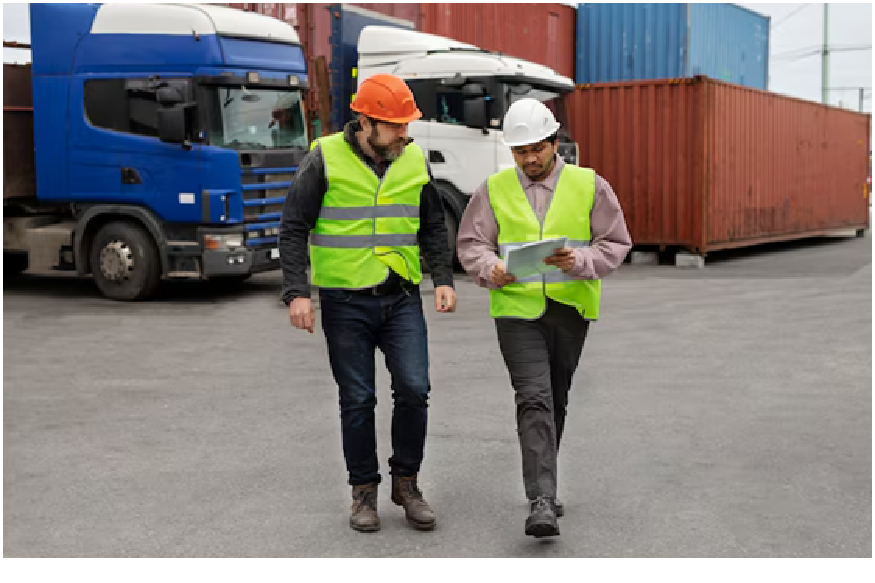Global supply chains are complex networks of shippers and carriers working with logistics providers to efficiently move goods from one location to another. Freight brokerage is a key component of optimizing supply chains due to the increasing demand for more efficient and cost-effective transportation. Freight brokers act as intermediaries, between shippers and transporters. They ensure that freight is transported efficiently and economically.
Freight brokers have revolutionized the supply chain in recent years thanks to technological advances and innovative business practices. Freight brokerage has revolutionized the supply chain industry by improving efficiency, cutting costs and leveraging cutting edge technology.
The role of freight brokers in supply chain optimization
Freight brokers are essential in helping to bridge the gap between shippers, carriers and improve logistics. They are responsible for:
- Connecting Shippers to Reliable Carriers Freight brokers use their extensive network of carriers in order to find the most cost-effective transportation options for shippers.
- Transport Costs are Reduced: By negotiating rates that are competitive and optimising routes, brokers can help to reduce freight costs.
- Transparency and Real-Time Tracking: Modern logistics technology allows brokers to provide real-time tracking. This ensures better visibility of shipments.
- Documentation and Compliance: Freight brokers are responsible for handling all paperwork, permits and regulations necessary to ensure smooth transport operations.
Freight brokers can help improve the performance of logistics by streamlining their processes.
Technology-Driven Advancements in Freight Brokerage
Technology is one of the most important ways that freight brokerage has revolutionized the supply chain industry. Artificial intelligence, digital freight brokerage platforms and automation are driving innovation.
1. Digital Freight Matching
Digital freight matching platforms are used by modern freight brokers to match shippers and available carriers in real time. These platforms use AI and machine-learning to analyze shipment information, carrier availability and pricing trends in order to find the most suitable match for each load. It eliminates the need to make time-consuming calls and conduct manual negotiations. This speeds up the shipping process.
2. Tracking in Real Time and Visibility
Freight brokers meet this demand by providing GPS tracking and real time shipment monitoring. Tracking systems that are more advanced provide businesses with accurate information on the location of their shipments and estimated arrival times. They also alert them to any delays.
3. Automated Freight Documentation
It can take a lot of time to handle freight paperwork, such as bills-of-lading, declarations of customs and compliance documents. Brokers can generate and process these documentations quickly and accurately, which reduces errors and ensures compliance with industry regulations.
4. Data Analytics for Better Business Decisions
Freight brokers use big data analytics for route optimization, demand forecasting, and cost-efficiency. Brokers can take informed decisions by analyzing historic shipping trends, traffic patterns and fuel costs. This will lead to a reduction in expenses and quicker delivery.
Efficiency and cost savings through improving efficiency
Freight brokers can provide significant benefits for the supply chain. They reduce transportation costs, optimize load capacity and improve service reliability. Here’s how:
1. Reduce Empty Miles to Increase Load Efficiency
The transportation industry faces a major challenge when trucks are not carrying freight. Freight brokers utilize advanced routing technologies and load-matching system to reduce empty miles. This ensures that carriers are operating at maximum capacity. Fuel waste is reduced, carriers are more profitable and shipping costs are lower for businesses.
2. Negotiating competitive rates
Freight brokers possess extensive knowledge of the industry and have established relationships with carriers. This allows them to negotiate lower rates than what shippers could achieve on their own. Brokers can offer cost-effective solutions for both carriers and shippers by leveraging their market insights.
3. Improve Delivery Speed and Reliability
Freight brokers have a wide network of carriers that they can use to match shipments up with the most reliable transport providers. Businesses can avoid delays, increase customer satisfaction and meet delivery deadlines by working with a broad network of carriers. Brokers also offer contingency plans in case of unexpected problems. This helps to keep shipments on track.
The shift towards sustainability in freight brokerage
Freight brokers play a key role in promoting sustainable supply chains, as environmental concerns are on the rise. Some of the key initiatives include:
- Using advanced logistics software to reduce fuel consumption and emissions.
- Encourage the use of eco-friendly vehicles: Many brokers give priority to carriers who operate fuel-efficient electric trucks or those that are powered by batteries. This helps minimize their carbon footprint.
- Reduce Paper Waste With Digital Documentation. The move to electronic documents and cloud-based software has reduced the amount of paper used in freight management.
By incorporating sustainability-focused strategies, freight brokers help businesses achieve their environmental goals while maintaining cost efficiency.
The Freight Brokerage Industry: Challenges and Opportunities
Despite the many advantages of freight brokerage, it continues to face several challenges which continue to influence its evolution.
1. Market volatility and pricing fluctuations
Fuel prices, disruptions in the supply chain, and seasonal changes in demand can all affect freight rates. Brokers need to adapt to the market constantly to offer the best price solutions.
2. Transporter Shortages and Capacity Limitations
Due to the increasing demand for freight, it has become increasingly difficult to find reliable carriers. To ensure that their clients receive consistent service, brokers must develop strong relationships with trucking firms.
3. Regulatory Compliance
Freight brokers have to navigate complicated regulations related transportation safety, cross-border shipping, and labor laws. It is important to stay compliant with all federal and state regulations in order to avoid legal issues and maintain credibility.
Future of Freight Brokerage
Freight brokerage will continue to evolve as the logistics industry grows. It is expected to become more customer-focused and environmentally sustainable. Freight brokerage is influenced by a number of key trends.
- AI integration and increased automation: AI will be used by more brokers to optimize operations, improve pricing and make better decisions.
- Expansions of Blockchain Technology. Blockchain technology can improve transparency, security and efficiency for freight transactions. This will reduce fraud and increase trust between parties.
- The rise of on-demand Freight Services. Just as ridesharing apps have revolutionized the transportation industry, platforms for on-demand freight brokerage will continue to shape this sector.
By improving efficiency, reducing cost, and leveraging the technology to improve logistics management, freight brokerage is revolutionizing the supply chain industry. Brokers are helping companies streamline their shipping operations with digital freight matching and real-time tracking. They also use automated documentation and data-driven decisions.
Freight brokerage will continue to be a key player in the global supply chain as the industry embraces innovation, sustainability and smarter logistic solutions. Freight brokers, by staying on top of the latest technological advances and market trends, are more than just intermediaries. They are driving change in modern logistic.
This article was written by an expert at One Choice Logistics. One Choice Logistics is your local aggregate hauling specialist. They ensure that your construction projects are completed on time by offering reliable aggregate transport, supply and dump truck services across the United States. They specialize in hauling crushed stone, gravel, and sand. The fleet of high-quality dump trucks ensures timely deliveries for your project. One Choice Logistics, a company dedicated to safety, precision and customer satisfaction is a trusted partner in dirt hauling St Lucie County services and nationwide.
How freight brokerage is revolutionizing the supply chain industry
Global supply chains are complex networks of shippers and carriers working with logistics providers to efficiently move goods from one location to another. Freight brokerage is a key component of optimizing supply chains due to the increasing demand for more efficient and cost-effective transportation. Freight brokers act as intermediaries, between shippers and transporters. They ensure that freight is transported efficiently and economically.
Freight brokers have revolutionized the supply chain in recent years thanks to technological advances and innovative business practices. Freight brokerage has revolutionized the supply chain industry by improving efficiency, cutting costs and leveraging cutting edge technology.
The role of freight brokers in supply chain optimization
Freight brokers are essential in helping to bridge the gap between shippers, carriers and improve logistics. They are responsible for:
- Connecting Shippers to Reliable Carriers Freight brokers use their extensive network of carriers in order to find the most cost-effective transportation options for shippers.
- Transport Costs are Reduced: By negotiating rates that are competitive and optimising routes, brokers can help to reduce freight costs.
- Real-Time Tracking & Transparency: Modern logistics technology allows brokers to provide real-time tracking and transparency, improving shipment visibility.
- Managing compliance and documentation: Freight brokers manage the paperwork, permits and regulations necessary to ensure smooth transport operations.
Freight brokers can help improve the performance of logistics by streamlining their processes.
Technology-Driven Advancements in Freight Brokerage
Technology is one of the most important ways that freight brokerage has revolutionized the supply chain industry. Artificial intelligence, digital freight brokerage platforms and automation are driving innovation.
1. Digital Freight Matching
Digital freight matching platforms are used by modern freight brokers to match shippers and available carriers in real time. These platforms use AI and machine-learning to analyze shipment information, carrier availability and pricing trends in order to find the most suitable match for each load. It eliminates the need to make time-consuming calls and conduct manual negotiations. This speeds up the shipping process.
2. Real-time tracking and visibility
Freight brokers meet this demand by providing GPS tracking and real time shipment monitoring. Tracking systems that are more advanced provide precise updates on the location of shipments and their estimated arrival times. This allows businesses to plan better and reduce downtime.
3. Automated Freight Documentation
It can take a lot of time to handle freight paperwork, such as bills-of-lading, declarations of customs and compliance documents. Brokers can generate and process these documents more quickly and accurately, while reducing errors.
4. Data Analytics for Better Business Decisions
Freight brokers use big data analytics for route optimization, demand forecasting, and cost-efficiency. Brokers can make better decisions by analyzing shipping patterns, fuel costs and traffic patterns. This will lead to lower costs and quicker delivery.
Cost-effectiveness and efficiency improvements
Freight brokers can provide significant benefits for the supply chain. They reduce transportation costs, optimize load capacity and improve service reliability. Here’s how:
1. Reduce Empty Miles to Increase Load Efficiency
The transportation industry faces a major challenge when trucks are not carrying freight. Freight brokers utilize advanced routing technologies and load-matching system to reduce empty miles. This ensures that carriers are operating at maximum capacity. Fuel waste is reduced, carriers are more profitable and shipping costs are lower for businesses.
2. Negotiating competitive rates
Freight brokers possess extensive knowledge of the industry and have established relationships with carriers. This allows them to negotiate lower rates than what shippers could achieve on their own. Brokers can offer cost-effective solutions for both carriers and shippers by leveraging their market insights.
3. Improve Delivery Speed and Reliability
Freight brokers have a wide network of carriers that they can use to match shipments up with the most reliable transport providers. Businesses can avoid delays, increase customer satisfaction and meet delivery deadlines by working with a broad network of carriers. Brokers also offer contingency plans in case of unexpected problems. This helps to keep shipments on track.
The shift towards sustainability in freight brokerage
Freight brokers play a key role in promoting sustainable supply chains, as environmental concerns are on the rise. Some of the key initiatives include:
- Optimizing Routes for Fuel Efficiency: A logistics software can help determine the most fuel efficient routes and reduce emissions.
- Encourage the use of eco-friendly vehicles: Many brokers give priority to carriers who operate fuel-efficient electric trucks or those that are powered by batteries. This helps minimize their carbon footprint.
- Reduce Paper Waste With Digital Documentation. The move to electronic documents and cloud-based software has reduced the amount of paper used in freight management.
By incorporating sustainability-focused strategies, freight brokers help businesses achieve their environmental goals while maintaining cost efficiency.
The Freight Brokerage Industry: Challenges and Opportunities
Despite the many advantages of freight brokerage, it continues to face several challenges which continue to influence its evolution.
1. Market volatility and pricing fluctuations
Fuel prices, disruptions in the supply chain, and seasonal changes in demand can all affect freight rates. Brokers need to adapt to the market constantly to offer the best price solutions.
2. Transporter Shortages and Capacity Limitations
Due to the increasing demand for freight, it has become increasingly difficult to find reliable carriers. To ensure that their clients receive consistent service, brokers must develop strong relationships with trucking firms.
3. Regulatory Compliance
Freight brokers have to navigate complicated regulations related transportation safety, cross-border shipping, and labor laws. It is important to stay compliant with all federal and state regulations in order to avoid legal issues and maintain credibility.
The Future of Freight Brokerage
Freight brokerage will continue to evolve as the logistics industry grows. It is expected to become more customer-focused and environmentally sustainable. Freight brokerage is influenced by a number of key trends.
- AI integration and increased automation: AI will be used by more brokers to optimize operations, improve pricing and make better decisions.
- Expansions of Blockchain Technology. Blockchain technology can improve transparency, security and efficiency for freight transactions. This will reduce fraud and increase trust between parties.
- The rise of on-demand Freight Services. Just as ridesharing apps have revolutionized the transportation industry, platforms for on-demand freight brokerage will continue to shape this sector.
By improving efficiency, reducing cost, and leveraging the technology to improve logistics management, freight brokerage is revolutionizing the supply chain industry. Brokers are helping companies streamline their shipping operations with digital freight matching and real-time tracking. They also use automated documentation and data-driven decisions.
Freight brokerage will continue to be a key player in the global supply chain as the industry embraces innovation, sustainability and smarter logistic solutions. Freight brokers, by staying on top of the latest technological advances and market trends, are more than just intermediaries. They are driving change in modern logistic.
This article was written by an expert at One Choice Logistics. One Choice Logistics is your local aggregate hauling specialist. They ensure that your construction projects are completed on time by offering reliable aggregate transport, supply and dump truck services across the United States. They specialize in hauling crushed stone, gravel, and sand. The fleet of high-quality dump trucks ensures timely deliveries for your project. Committed to safety, precision, and customer satisfaction, One Choice Logistics is the trusted partner for dirt hauling services St Lucie County and nationwide.





